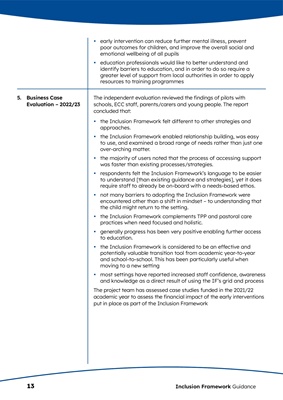
13 Inclusion Framework Guidance
5. Business Case
Evaluation - 2022/23
y early intervention can reduce further mental illness, prevent
poor outcomes for children, and improve the overall social and
emotional wellbeing of all pupils
y education professionals would like to better understand and
identify barriers to education, and in order to do so require a
greater level of support from local authorities in order to apply
resources to training programmes
The independent evaluation reviewed the findings of pilots with
schools, ECC staff, parents/carers and young people. The report
concluded that:
y the Inclusion Framework felt different to other strategies and
approaches.
y the Inclusion Framework enabled relationship building, was easy
to use, and examined a broad range of needs rather than just one
over-arching matter.
y the majority of users noted that the process of accessing support
was faster than existing processes/strategies.
y respondents felt the Inclusion Framework's language to be easier
to understand [than existing guidance and strategies], yet it does
require staff to already be on-board with a needs-based ethos.
y not many barriers to adopting the Inclusion Framework were
encountered other than a shift in mindset - to understanding that
the child might return to the setting.
y the Inclusion Framework complements TPP and pastoral care
practices when need focused and holistic.
y generally progress has been very positive enabling further access
to education.
y the Inclusion Framework is considered to be an effective and
potentially valuable transition tool from academic year-to-year
and school-to-school. This has been particularly useful when
moving to a new setting
y most settings have reported increased staff confidence, awareness
and knowledge as a direct result of using the IF's grid and process
The project team has assessed case studies funded in the 2021/22
academic year to assess the financial impact of the early interventions
put in place as part of the Inclusion Framework